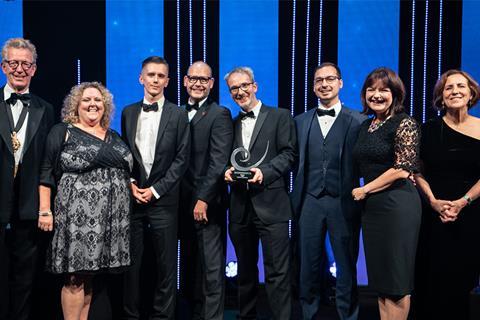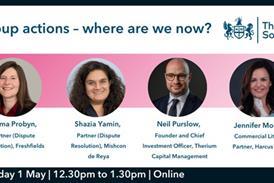The judges at the 2019 Excellence Awards were impressed by CFG Law’s ‘Client First Service’, which focuses on understanding the needs and wellbeing of clients who have suffered a catastrophic injury.

We asked the firm’s CEO, Richard Clark, about the team’s approach to client service.
CFG offers a holistic approach to client service. How did you identify gaps where you could better meet clients’ needs and offer additional support?
The simple answer is that we started by asking the people we work with and support – the clients, their families, their friends. There’s no point creating something if it doesn’t meet the needs of the client. Their feedback showed where we could improve and where they felt they needed more support. That was the starting point for the Client First Service but then we asked ourselves (and we still ask the same question): “What would we do if this was our family member?”
We deliberately keep our ratio of cases to fee earner lower than most other businesses
For us, it’s about pulling together with the client and their family. By doing this, and by listening to what our clients and their families say they need, we’ve learnt that, while recovering compensation is important, it is the extra things we do and the support we provide that really help. But we’ve no intention of resting on our laurels. We’re constantly listening to our clients and our service will continue to evolve as the needs of our clients and the market continue to evolve. We offer a highly personal, bespoke service. It has to keep developing so we can meet the individual needs of the people we help.
Client service is becoming increasingly critical to delivering legal services. What do you see as the most important changes you have made in this area at CFG Law?
Client service has always been core to what we do here. We’ve placed it right at the heart of our business through our unique Client First Service offering.
It’s not just about putting the injured person first but also their family and friends, as we believe that leads to the best possible outcome for everyone.
As well as legal advice, we focus on providing the financial, physical and emotional support our clients and their families need from day one, including providing an emergency fund in many cases – enabling us to plug any gaps in support straight away, rather than waiting for an interim payment.
We work proactively on our cases, enabled by the fact that we deliberately keep our ratio of cases to fee earner lower than most other businesses. It allows us to do two things – firstly, to do more than you would usually expect from a law firm and also, to manage cases intensively so we can achieve the best outcome for our client and the people around them without unnecessary delay. I believe that’s what makes the Client First Service different and the feedback we get from our clients, their families and their friends, as well as organisations we work with, is really positive as a result.
How have these changes affected your firm’s business?
Being different is always a good thing. Obviously, our clients come first and their feedback shows that the Client First Service is of real value to them. It’s had a positive impact on generating new business and the feedback we get from the organisations, injured people and families we’re working with is great. They see us doing something different, something interesting. That’s a great feeling.
We’ve recruited 27 people this year into our growing business and the reputation of the Client First Service has definitely helped along with opening our new office in Manchester City Centre. We recently captured our colleagues’ views on working for CFG – “CFG life” as we call it, which included comments such as “a sense of achievement every day” and “I love the fact we make a real difference at the earliest opportunity” – and they now feature on walls around our two offices in Cheadle and Manchester and on social media.
Having lower caseloads per fee earner has really changed things too. Our legal teams have time to visit clients and their families, get to know them and help with more than just legal advice. It works for our clients and our colleagues too – they regularly cite it as one of their favourite aspects of CFG life.

What are the key challenges that solicitors in your firm face when dealing with serious injury cases at the moment?
Every case is different, the effects of every injury are different. So we set out to treat every injured person, their family and their friends as individuals, right from the start. We know that the fact we visit clients regularly is hugely appreciated by people who are facing circumstances which are almost always life-changing. Whatever challenges we face, they aren’t on the same scale as those of the people we work with.
Through our Client First Service, we seek to work collaboratively with insurers under the Serious Injury Guide as we feel it delivers the best outcomes with no unnecessary delay. When it works, it’s successful for all parties, giving early access to substantial interim payments, case efficiency, embracing alternative dispute resolution and reducing costs. If it doesn’t work, we then use bespoke case planning to ensure we operate efficiently, obtaining our experts’ reports without delay so we can issue and rigorously pursue large interims to allow our clients to obtain the rehabilitation and support they need. Cutting out unnecessary delay is key to our Client First Service offering.
The biggest challenge I think law firms face is to adapt to the instant-access world of the likes of Amazon and social media
The problems arise when cases when issues are stalled at the civil courts and this is where government reforms and court closures have really affected access to justice. Gone are the days when an interim payment application could be issued with a ‘certificate of urgency’ and a court hearing in front of a suitably experienced judge was possible in four weeks. Now, it’s a sad reality that waiting in excess of six months in some courts to get a listing is not unusual. Despite our best efforts to ensure there are no delays, the claimant is not in the same position as the defendant. The civil court system is not delivering access to justice and the claimant is in a postcode lottery in many cases, which can’t be right. It’s a huge issue affecting some of the most vulnerable people in society which politicians need to address urgently.
How do you support and train your team to make sure they can provide a high standard of service to clients?
The Client First Service is our single biggest point of difference to other firms and we know, from what our clients and the organisations we work with tell us, that it’s delivering a service that people really want.
When you have something like that, you’ve got to invest time in making sure everyone understands it and they’re delivering it every day. So we have regular Client First Service training for our colleagues – and not just those in legal teams. Everyone in our business has a role.
But it doesn’t stop there. We see our colleagues as our greatest asset. That’s why we invest in our people from day one, with a comprehensive induction to help them feel at home in our business immediately, to feel supported. They can also advance their careers via a tailored development plan, whether they’re a legal expert or helping our business grow in another area. We work in partnership with Dale Carnegie to provide courses both in-house and externally to develop management and leadership skills.
The firm works with other organisations including healthcare, charities and insurers. How does this work in practice?
Well, a great example would be the exciting new partnership we’ve just launched with the Spinal Injuries Association (SIA), featuring real cases of people living with spinal cord injury (SCI), their family and their friends. Together, we’ve produced ‘snapshots of SCI’ with endorsement from people such as former England under-21 rugby star Matt Hampson (his dad and his best mate speaking about the effect Matt’s SCI had on all of them), as well as Claire Williams, principal of the Williams F1 team, whose father suffered an SCI in the 1980s.
It’s not sponsorship, it’s not just a cheque we’ve written. We’ll be working hand in hand with the SIA to improve awareness of the challenges family and friends face as well as the injured person.
It goes to the core of our purpose – helping those affected by injury, together – and we see the holistic focus on those relatives and friends around the injured person as being key to helping our clients achieve their best possible outcome. We’re excited to see how this partnership develops – and we’re looking to develop similar partnerships with other organisations in the future.
What three things would you advise firms to focus on, if they want to improve their own client care?
Be personal, be authentic, be available. The legal sector has so much catching up to do. We live in an instant world and too many legal services operate more slowly than everything else people buy or use.
That’s especially the case when working with people who’ve suffered a serious injury. Why should they wait to speak to their legal team? What can possibly be more important than pulling together with them at a time when they’re facing huge challenges?
The biggest challenge I think law firms face is to adapt to the instant-access world of the likes of Amazon and social media. Clients won’t ask for it. They’ll expect it. They already do.
Lawyers, sadly, don’t have the best reputation and especially litigation lawyers. People don’t understand the law, and the time things take. It’s up to lawyers to adapt to those challenges and to make sure they’re explaining what they’re doing and why, and to get the best outcome without unnecessary delay.
And drop the endless legalese. People don’t understand legal speak – so why use it? Again, when you’re dealing with an injured person, their family, their friends at a time when they’re coming to terms with a serious injury, often a life-changing injury, put yourself in their shoes. Then ask yourself what you want for your family? Not many people would want complex, long letters.
It’s time for the legal sector to catch up.

















